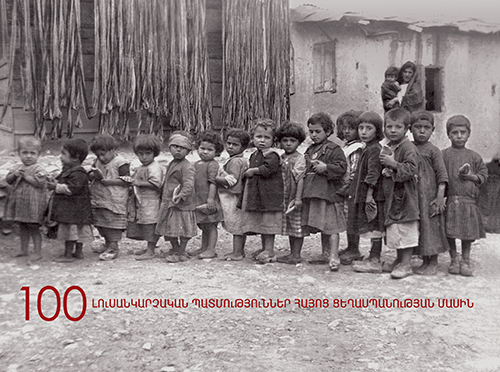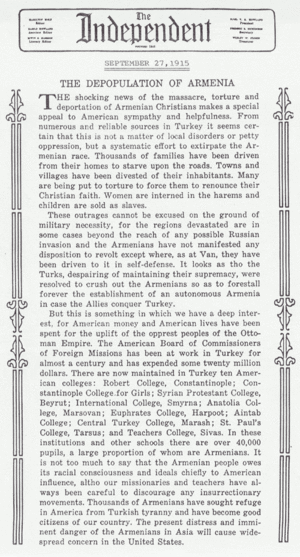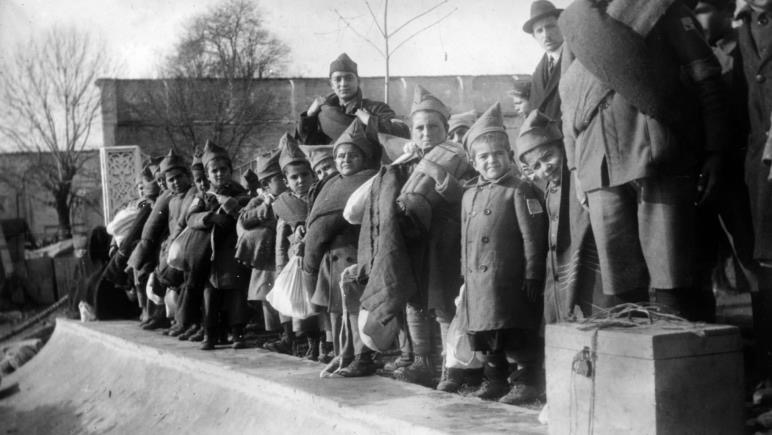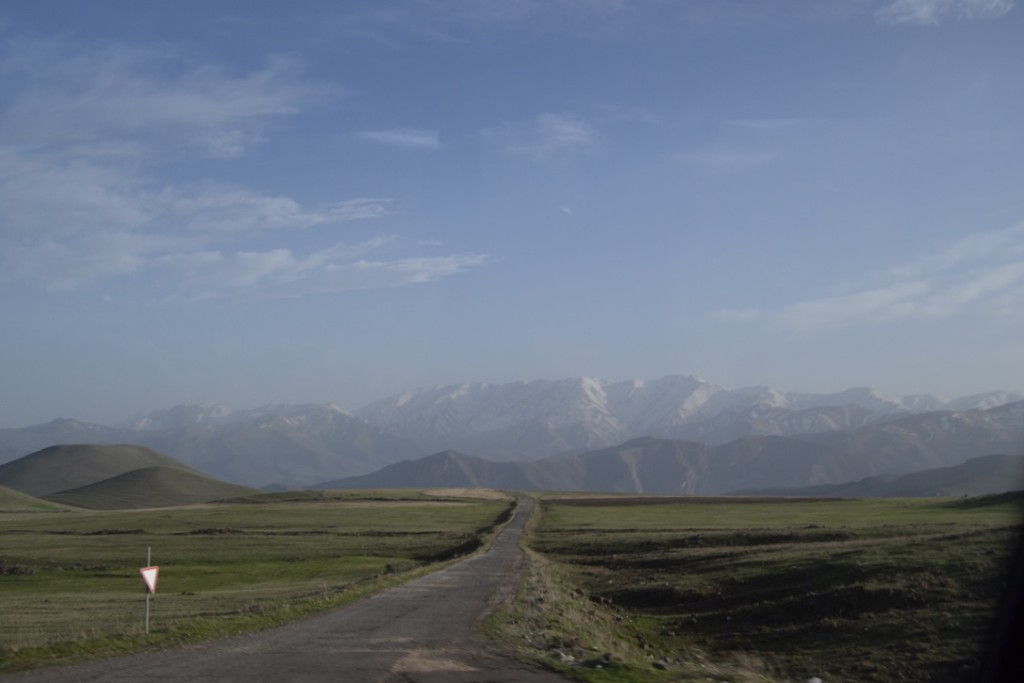
A photograph of Armenian orphans whose parents were killed in the genocide
This is for my grandfather, Vostan, who having never lived to see me in the flesh, has nevertheless taught my mother – and in turn myself and my sister – the spirit of resilience, endurance, and courage when the odds were against us.
Last year marked the 100th year of the remembrance of the Armenian genocide (April 24, 1915), where over 1.5 million Christian Armenians were killed and millions of others displaced. One of them was my grandfather.
Early last year I was given a grant by my university to visit Armenia to view some manuscripts for my research. I believe by God’s arrangement and timing, I was also able to attend the centennial and the canonisation of the Armenian martyrs while there.
I also celebrated a unique Coptic liturgy with His Grace Bishop Raphael and a handful of Arabic-speaking Armenians and a full Armenian deacon (who tried to follow along the liturgy but it was too different for him) in an ancient crypt – one of the most beautiful liturgies I have ever attended. (Not to mention Armenia is one of the most beautiful places I have visited — I have posted several photos from my trip below)
I stayed in Armenia a few weeks and arrived the day of the canonization that took place in the ancient city of Etchmiazdin. Thousands gathered and dozens of church leaders (including Pope Tawadros and Bishop Raphael) attended along with international delegates. Interviews with genocide survivors played on the wide-screens in the courtyards and countless stories were told by generations of the attempt of an extinction of an entire race. Although the church grounds were crowded with people, a peaceful presence filled the atmosphere. Church bells across the globe were rung in honour of those victims – from Stephensplatz in Vienna, to Notre Dame in Paris, churches in Cairo, New York to Russia…The environment was moving to say the least.
Many of us may have heard about the genocide, especially last year as thousands upon thousands across the world marched and protested, beseeching for recognition by the Turkish government that the massacre was indeed a genocide (for what we deny, history inevitable repeats itself) – Among the millions of Armenians who escaped, my grandfather fled by foot at the age of 6 from Eastern Armenian (present day Van, Turkey) to communist Russia (a journey of hundreds of miles – a concept I still cannot grasp) and was later displaced to Iran as Armenians were kicked out in 1938 by Stalin’s commands. His sister, who was said to be pregnant, was killed during the massacre. 
Many Armenians were raped, killed, crucified naked, babies boiled to death in front of their mothers…
So what does the Armenian genocide have to do with Christian nationalism? Much in every way.
There are so many of us, especially in the West, who are profusely self-consumed and consciously unaware of the world around us. Yes, we have our day to day tasks of business, work, family, church, and so forth – but some of us, more than not, are consumed in our ‘me’ bubble that the sufferings, atrocities, genocides happening (and those which have past) to our brethren in the world are not welcome in our self-constructed me-bubble space.
How often do I come across people who never understand or follow what is occurring with the Syrian crisis with millions of displaced people, or have never heard of the Rwanda genocide, or even the genocide of the Armenian people (of whom we call ‘brethren’ in Christ – a fabrication of a title if it is not realised).
In the recent years of the Egyptian revolution, the martyrs in Libya and Maspero and the countless of murders, kidnappings and oppression the Copts have faced – we, in the West, over-flooded our News Feed with images, stories, retweets of concerns, request for prayers, and at times contributed to status’s of Coptic’ ‘idealism’ and have being utmost proud during these times to be named a Copt.
I am in no measure outweighing the need to be concerned with Egypt and those suffering persecution and martyrdom – and yes we should be proud to share that faith of bravery, utter sacrifice, and love. Although those brief memos, photos, and 140–character posts at times may reflect our support and show our concern, it does not hold the weight of biblical standards which are required of us.
As I often say, the Scriptures have a simple yet very difficult message – to love our enemies (Matt 5), to love others as He loves us (John 15 – if we think for a moment about this one, it is utterly impossible, but only divine possible to fulfill), to give to him who wants to steal from us further possessions (Matt 5), to walk with a person an extra mile (we barely can text people back nowadays)—and the list goes on…(many of us even cannot face someone who has wronged us or those we have wronged, often running away or avoiding them completely in cowardice, let alone giving our belongings or diminishing our pride).

But even the basics we completely surpass- to merely remember the brethren who are in prison as if chained with them (Heb 13:3), to visit the widows and orphans (James 1), to pray for the missionaries, to clothe the poor (Matt 25 – how many of our closets our over-flooded with clothes we ‘will one day’ wear), to pray for the persecuted, to help those in bondage go free, to comfort those who mourn (Isaiah 61) – and yet, we may be those who oppress others, and cause others to mourn or chain others with our unforgiving-ness, bitterness, anger, or unwillingness to pray for others needs and sufferings.
We often need to step out of ourselves – our own worries, constant desires and lack of satisfaction – and see the suffering world and the other’s needs and see how that in itself shapes, transforms and fills us. The power of prayer for the other is incomprehensibly powerful. The Scriptures have often been replaced by my idealistic life – of what I want, what I portray myself in ‘needing’ and my self-consumed desires; isolating the needs of my shared humanity apart from myself.
If you have heard me speak – I often say that being human means being selfless, and being selfish means being subhuman (or dehumanising oneself)..for the ultimate and perfect human was Christ, the God-man, who showed us what it means to be human, to be utterly kenotic. (Have you heard of the African saying ‘I am because we are’?) This is why the simple yet difficult (and greatest) command is to love your neighbour as yourself – because your neighbour is yourself. We are a shared humanity; intricately woven in this mystery of life – and we are not made apart from each other. Even if we tirelessly create our ‘me’ bubbles, it will never deny this reality that we are all God-made, connected by the hands of the artistic Creator.
If we are scarcely aware of our ‘brethren’ among other nations and are ignorant of their atrocities (past and present) – sufferings, persecutions, genocides, how are we even aware of our own value of life (our brother is our self) – and dare to say we are proud-Orthodox Christians, when we know nothing other than the conflicts in the motherland? (There was an Egyptian elderly woman who thought my mother’s family mother was of Islamic lineage because her father was from present-day Turkey, not knowing that was past-Christian Armenian nor not knowing about the Armenian genocide and that her very family was killed because of their Christianity). (How many of know about the Armenian Kim Kardashian but know less about the Christian country itself?)
I am in no way negating the necessity and native relationship many of us have to our ethnic roots (that is for many of us Egypt, others it can be other places or identities)… but these thick ties of identity and nationalism supersede our identity in connecting my humanity – our humanity– towards the other non-Copt (even it be our Syrian Christians, Armenians, Greeks… let alone non-Christians), who suffer from oppression, depression, loneliness, lack of compassion and acceptance from those around them, and so on.
We throw our Coptic -idealism in trying to preach to others that same ‘me bubble’ – that national identity (I am proud to be Coptic because my fellow Copts died in His name, or ‘Egypt is where Jesus spoke Coptic…’ as many of us heard before; but Jesus also spoke Aramaic – probably better than Coptic (no, not Armenian– as many people ask me this)…
While it is a proud thing to say I share in the blood of the martyrs – for it is because of their bravery, their confession, their love and faith – I have received my faith (for indeed ‘the blood of the martyrs is the seed of the Church’ says Tertullian) – but this proclamation of inheriting these martyrs blood is useless if we do not also share in the proclamation of the blood of our shared humanity throughout the rest of the world. We do not pick and choose who we share our blood with, it is our God-given humanity and inheritance that my neighbour is myself.
When I lived in Stevenage a few years ago, the daughter of the world renowned heart surgeon Sir Magdy Yacoub was visiting His Grace Bishop Angaelos. I then heard about the children’s organisation that Sir Magdy founded – ‘Chain of Hope’ – where children with urgent heart conditions globally are attended to. This was my first experience that a Copt was supporting an organisation (let alone founded one) that met the needs of those outside of Egypt. (I remember many of us youth during the Haiti crisis were packaging donated medicine from his organisation to the Haitian people). It is necessary to serve and attend to the needs of Egypt, but Egypt is not all humanity; there is no such thing as marginalised Christianity.
We need to become more aware and attentive to the needs of those around us, – local and globally – from the atrocities in the villages of South America to the needs of my colleague who sits next to me. While we cannot know and do everything of course – nevertheless, it up to us to be pro-active in the capacity that we have – in prayers, in listening to others, in being compassionate towards an angry friend, in learning and supporting the pains of others. My brother is my responsibility.
Awareness brings freedom, and this freedom is shared with the divine Creator and our humanity – in turn making us ‘human’. We need to become more aware, more prayerful, more pro-active in helping those at are very doorstep. It is our duty to pray for the world at the very least. (I heard of a man who was once visited by a priest and the priest saw in his office a large world map with push pins on it hung in the room. The priest asked about the map and the man told him that he would offer prayers daily for each place according to what was happening – tsunamis, poverty, communism, persecution, genocide…)
These offerings of love and of mere prayers, of sharing my humanity with the other – is a mere portrayal of the calling which we are called – so we may become human – in becoming more divine – more like Him. Some people around us just sometimes need a touch of healing, a word of hope, a graceful smile… and we can be a catalyst of that antidote- small gestures can sometimes move mountains.
We need to ask ourselves often, are we offering to the world – to my humanity – an emblem of peace, a source of inspiration, of support? Or are we sowing seeds of anger, and division and hatred? The world around us often looks defeated, and it’s up to us, through his divine grace and power, to be a message of hope, a presence of peace, a word of comfort, a voice of prayer. This is our humanity, this is our responsibility.
Therefore I exhort first of all that supplications, prayers, intercessions, and giving of thanks be made for all humanity… (1 Timothy 2:1)

[gallery_bank type=”images” format=”masonry” title=”true” desc=”false” responsive=”true” display=”all” sort_by=”random” animation_effect=”bounce” album_title=”true” album_id=”2″]

 I'm an ever-learning student, who wishes to share what I've experienced and been taught throughout the years -- whether through personal experience and/or my academia in theology. I hope to inspire others to learn more about life, God, and for each one to find their desired purpose and calling in this world.
I'm an ever-learning student, who wishes to share what I've experienced and been taught throughout the years -- whether through personal experience and/or my academia in theology. I hope to inspire others to learn more about life, God, and for each one to find their desired purpose and calling in this world.